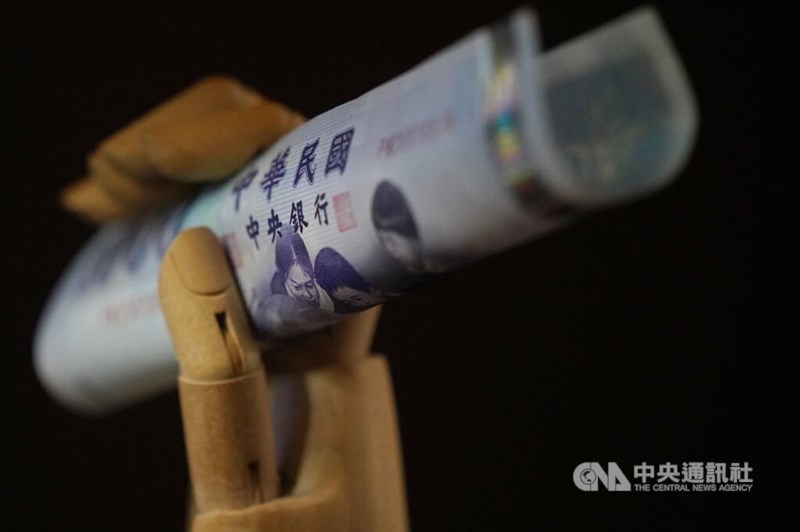
Taipei, June 7 (CNA) Taiwan's central bank will likely leave its key interest rates unchanged at its next quarterly policymaking meeting on June 19, which should be before the United States makes major tariff decisions, according to Cathay United Bank chief economist Lin Chi-chao (林啟超).
U.S. President Donald Trump's chaotic tariff policy rollout has roiled markets and caused significant uncertainty, with goods made in Taiwan and imported into the U.S. still possibly facing a 32 percent "reciprocal" tariff.
Semiconductors, which form the backbone of Taiwan's exports, could also be separately hit with even higher import duties if Trump follows through on his threats.
Speaking with CNA in an interview earlier this week, Lin said the global economic situation has become more complicated in the wake of Trump's tariff policies.
The 90-day pause Trump put on his "reciprocal" tariffs expires in early July, meaning that not only the local central bank but also the U.S. Federal Reserve will likely leave their interest rates intact before the results are announced.
If the forecast turns out to be true, the Central Bank of the Republic of China (Taiwan) will keep its monetary policy unchanged for the fifth consecutive quarter at the June policymaking meeting.
The discount rate would stay at 2 percent -- which is still the highest in 15 years -- the rate on accommodations with collateral would remain at 2.375 percent and the rate on accommodations without collateral would continue at 4.250 percent.
Lin said the impact of the tariff issues could become more obvious in the third quarter of this year.
The Directorate General of Budget, Accounting and Statistics (DGBAS) recently projected that Taiwan's gross domestic product (GDP) grew 5.35 percent in the first half of 2025 but would only grow 1 percent in the second half of the year, in part over tariff concerns.
Lin said the significant GDP growth in the first half largely came from a robust increase in exports as foreign buyers rushed to place orders before the 90-day pause came to an end, with the tech sector the largest beneficiary.
He said the tariff impact is expected to dramatically slow down the pace of the economic growth in the second half of 2025.
Dachrahn Wu (吳大任), director of National Central University's Research Center for Taiwan Economic Development, said the tariff policy might not only hurt exports but also private investment, as some high-tech companies diversify their production to the U.S.
In addition to the tariff worries, Lin said, the central bank has concerns over a stronger Taiwan dollar against the U.S. dollar, which could affect the profit margins of many Taiwanese exporters.
The central bank admitted it aggressively intervened in the forex market in May to slow down the pace of the Taiwan dollar's appreciation against the U.S. dollar, but only after the local currency rose a dramatic 6.21 percent on May 2 and 3.
The Taiwan dollar stayed strong against the U.S. dollar in May and without the central bank's intervention it would have appreciated further against the greenback, dealers said.
But the U.S. dollar's depreciation is expected to continue amid hopes that the Fed will cut interest rates in September and December to boost the economy, dealers added.
Under those circumstances, Lin said, Taiwan's economy rather than inflationary pressures should be the top priority for the central bank to look at.
Commenting on the Taiwan dollar's strength, Wu said since the beginning of this year, the local currency has appreciated almost 10 percent against the greenback.
Because of that, companies other than tech giants with high gross margins like contract chipmaker Taiwan Semiconductor Manufacturing Co.(TSMC), could see their bottom lines eroded sharply, Wu said.
Echoing Wu, Wang Jiann-chyuan (王健全), vice president of the Chung-Hua Institution for Economic Research (CIER), said tech companies in the global artificial intelligence supply chain will not be too bothered by a stronger Taiwan dollar, but old economy industries could be hurt by foreign exchange losses.
- Society
Air conditioner installation accident claims man's life
07/03/2025 10:40 PM - Cross-Strait
Protesters call for apology as MAC defends Chinese spouse rule
07/03/2025 10:01 PM - Business
Taiwan to bring Threads under its anti-fraud regulatory framework
07/03/2025 09:36 PM - Cross-Strait
Chinese rocket enters Taiwan ADIZ, poses no threat: Taiwan military
07/03/2025 09:04 PM - Cross-Strait
July 26 Kinmen-Xiamen swim still under MAC review
07/03/2025 08:59 PM